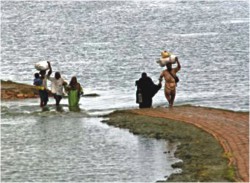|
||||
On a sustainable development trajectory -- Mohammed Farashuddin Steering the economy in 2010 -- Professor Mustafizur Rahman Food Prices and Security Exploding myths, highlighting lessons -- Rizwanul Islam Rising inequality takes shine off growth --M M Akash Rural financing ~ the innovative way -- Khondkar Ibrahim Khaled Participation and representation key to pro-poor planning -- Fahmida Khatun Why list on a stock exchange? -- A.F.M. Mainul Ahsan Pushing agriculture forward -- Dr. Quazi Shahabuddin Policy choices in the FDI domain -- Syeed Ahamed Capital market window to faster growth -- Abu Ahmed Regional Connectivity-Indo-Bangla initiative -- Dr. M. Rahmatullah Foreign banks' lively role -- Mamun Rashid Why regulatory reforms? -- Zahid Hossain Energy management issues -- M. Tamim Jute bubble, lest it bursts! -- Khaled Rab Climate Change Policy Negotiations-Can Bangladesh play a leading role? -- Dr. Saleemul Huq Copenhagen and beyond --Dr. Atiq Rahman Save Bangladesh, save humanity -- Dr A. M. Choudhury For a human rights-based approach -- Dr Abdullah Al Faruque Gender dimension to policy on disaster management -- Mahbuba Nasreen Rainwater harvesting -- Dr. Manoranjan Mondal Environmental degradation and security -- Dilara Choudhury Climatic impact on agriculture and food security -- Prof Zahurul Karim PhD Monoculture destroys coast and forests --Philip Gain Towards a strong adaptation strategy -- Md. Asadullah Khan Biodiversity conservation: Challenge and opportunity -- Mohammed Solaiman Haider Grameen Shakti's renewable energy role -- Abser Kamal
|
||||
| Climate Change Policy Negotiations Can Bangladesh play a leading role? Dr. Saleemul Huq
The recently concluded fifteenth conference of parties (COP 15) of the United Nations Framework Convention on Climate Change (UNFCCC) held in Copenhagen, Denmark in December 2009, ended very unsatisfactorily from the point of view of many parties, including Bangladesh. Nevertheless, as the objective of COP15 was to agree on global policy on climate change after the first commitment period of the Kyoto Protocol ends in 2012, there is still some time left for the work to be completed. The sixteenth conference of parties (COP16) will now be held in December 2010 in Cancun, Mexico and then COP17 will be held in South Africa in December 2011. Thus there is still time to engage in the global negotiations process to try to achieve an ambitious outcome, even if this was not possible in Copenhagen. It is also possible for Bangladesh to try to play a leading role in this process over the next year or two. However, first it is useful to assess, dispassionately, the role that Bangladesh has been able to play so far, in order to see how this can be built on and improved going forward. My own assessment of Bangladesh's role so far would be to say that Bangladesh certainly played a “prominent “role but far from a “leading” role. Let me explain what I mean by that. The government of Bangladesh has been involved in the intensive round of almost non-stop negotiations leading up to COP15 in December, very actively within the group of least developed countries (LDCs) of which it a key member, as well as the larger developing countries group known as the G77+China. In Copenhagen the Bangladesh delegation numbered nearly a hundred delegates, including not only senior government officials, several Ministers and even the Prime Minister, but also a number of Members of Parliament (including from opposition parties), media representatives, experts and NGOs. This inclusion of non-governmental actors in the official Bangladesh delegation is indeed a good sign as on this issue there is (or should be) no difference between the government and opposition or with civil society (at least at the international level). They were very active in highlighting Bangladesh's position as a vulnerable country as well as the action that the country is undertaking on tackling climate change (which are indeed very laudable). However, banging one's own drum (however, effectively) does not endear a country to its allies within the LDC Group or other vulnerable countries and they certainly felt that Bangladesh was only promoting itself (at the expense of the others in the group). In order to be a leader, a country (and its delegates) must earn the trust of others, who will acknowledge them as leaders (in other words, leaders need willing followers!). Unfortunately, by promoting itself the opportunity to gain the trust of others was undermined. Hence, while no doubt, playing a prominent role, the country was unable to play a truly leadership role. However, that does note mean that it cannot do so going forward over the coming two years. It certainly can, if it takes a number of actions including the following:
Appoint a high level special envoy for climate change Climate change will remain central for Bangladesh for many years (if not decades) to come and investing in such a High Level Special Envoy who has the trust of the Prime Minister and the requisite diplomatic (rather than technical) background and skills, along with a team from the relevant ministries, is essential even now. It will also have to take a more nuanced and leading role on behalf of the vulnerable countries of which it is one (however, insisting that Bangladesh is the “most vulnerable “ country is counter-productive if we wish to work with other vulnerable countries). Take initiative within Vulnerable Countries Forum Highlight adaptation and low carbon growth rather than vulnerability Spend climate change money wisely Conclusion The author is Senior Fellow at the International Institute for Environment and Development (IIED) in London, United Kingdom and the Director-designate of the new International Centre for Climate Change and Development (ICCCAD). |
||||
© thedailystar.net, 2010. All Rights Reserved |


